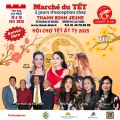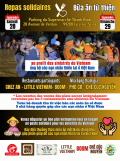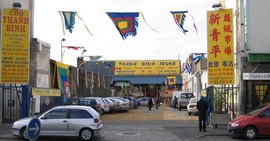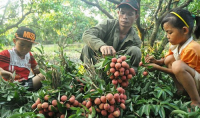No products
Categories
- FEE
- FROZEN
- Salty grocery
- Sweet Grocery
- BIO
- Alcohol & Drink
- BAZAAR
- Gift Ideas
-
B2B-Import
-
Vietnam
- Rice
- Rice leaves VN
- Alcohol & Boisson Vietnamese
- VN Aperitifs
- Vietnamese coffee
- Vietnamese tea
- VN Spices
- Flours VN
- VN Sauce
- Instant soup VN
- Condiment VN
- Canned vegetables VN
- Dried fruits & Vegetables VN
- Noodles & Vermicelli VN
- Cakes, biscuits VN
- Confectionery VN
- VN Frozen Products
- Products Bazaars VN
- Products Japan
-
Vietnam
- Vegetarian
-

-

-
Soupe Pho au boeuf - Phở Bò
2024-08-21 -
Ici Vietnam Festival 2024
2024-06-18
Blog categories
Vietnamese lychees now available for sale in France
Published on 2015-06-05
The first batch of Vietnamese lychees weighing around 500 kilograms is available for sale at a supermarket in France, government website chinhphu.vn reported.
The fruits are on sale at the Thanh Binh Jeune supermarket chain in the capital city of Paris and the city of Lyon, chinhphu.vn reported.
The idea of exporting the fruit was promoted by the trade office of the Vietnamese Embassy in France for over a year in a bid to find more export opportunities for Vietnamese lychees overseas so that Vietnam will not be dependent on the Chinese market.
The export of the first batch of Vietnamese lychees to the European country followed an initiative to diversify export markets for the fruit after the trade office learned that Vietnamese lychee farmers faced difficulties when they could not sell their produce to China last year, Commercial Counselor Nguyen Canh Cuong told news website vov.vn.
The initiative was launched after Cuong discovered that the fruit, mostly imported from South Africa and Madagascar, is popular among French people.
The main barriers for the Vietnamese fruit are the requirements for plant quarantine and costly shipment, for which the fruit must be treated with sulfur, a technology still strange to Vietnamese exporters, Cuong said.
If the first batch of Vietnamese lychees successfully sells in Paris, 7.5 more metric tons will be shipped there from now until the end of the lychee season in Vietnam, which is in July this year, he added.
Michel Pierre, a French agricultural engineer who is currently in charge of a Madagascar project on lychee preservation and export to France and the EU, has visited Bac Giang and Hai Duong Provinces in northern Vietnam to transfer relevant lychee processing technology and to train local technicians, the Vietnam News Agency reported.
The first containers of Vietnamese lychees to be sent to the U.S., already treated with irradiation, were shipped on Saturday last week by Anh Duong Sao Co., according to the Ministry of Agriculture and Rural Development.
Meanwhile, the first shipments to Australia will be freighted on June 10 by the Rong Do Company, after the Australian Department of Agriculture gave the green light as of May 11 for irradiation-treated lychees from Vietnam to be exported to the country.
There are only four companies participating in collecting and exporting the fruit to the U.S. and Australia.
Hard-earned effort
It has taken Vietnam over five years to adopt standardized cultivation processes and quarantine requirements so that the Vietnamese fruit can be accepted to be imported to the U.S. and Australia, Deputy Minister of Industry and Trade Tran Tuan Anh told local media at a press meeting on Monday.
The first batch of Vietnamese lychees sent to the two markets are a significant step forward as the fruit has successfully been awarded phytosanitary certificates to enter two of the strictest markets in the world, Anh said.
However, according to the deputy minister, Vietnam cannot expect bulk exports of the fruit to the U.S., Australia and the EU in the next two years, as it often takes 5-8 years for the process to be realized in general.
“Even when we are allowed to ship our fruit there, it will take time for the consumers in those countries to accept the produce, which will require great effort in keeping up with local regulations and maintaining many promotional campaigns there,” he added.
The two largest lychee-growing areas in Vietnam are Bac Giang and Hai Duong, which are expecting to harvest a total of 200,000 metric tons of fresh lychees in the 2015 crop, a 28.2 percent year on year rise, according to the Vietnam Trade Promotion Agency.
According to the Vietnamese Ministry of Industry and Trade, about 60 percent of the lychees, or 120,000 metric tons, will be sold domestically, while the remaining 40 percent, or 80,000 metric tons, including 85 percent of fresh fruits and 15 percent of dried and frozen fruits, are set aside for export to a number of foreign markets like Laos, Cambodia, Thailand, Singapore, the U.S., Australia, Japan, South Korea, and Europe
Source: talkvietnam.com
- Posted on
- THANH BINH dans la presse





COMMENTS
No customer comments for the moment.
Only registered users can post a new comment.